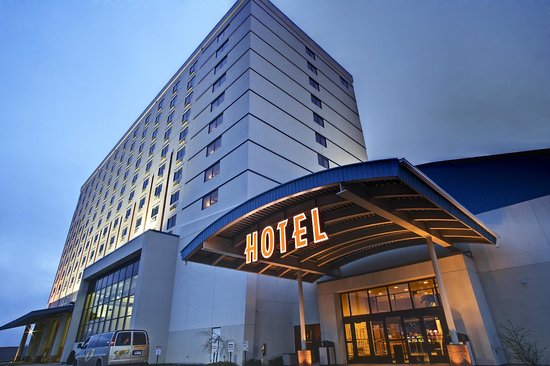
- Details
- By Native News Online Staff
As American Indian tribes around the country move to reopen tribal-owned casinos, governors in several states have pushed back with pleas and legal threats.
The push-and-pull has been most visible in California, which is home to 70 Native-owned gaming facilities that generate an estimated $8 billion in annual revenues and employ more than 60,000 people.
Last week, hundreds of gamblers lined up for hours at the Viejas Casino and Resort, near San Diego, according to a report in the New York Times. The casino, operated by the Viejas Band of Kumeyaay Indians, was one of more than a dozen Indian casinos that reopened last week in California, despite pleas from Gov. Gavin Newsom.
“This virus does not recognize jurisdictional boundaries, and it is in the best interest of public health to move toward reopening in concert,” Newsom wrote in a letter to tribal leaders, dated May 15.
The majority of the state’s 70 Indian casinos remain closed and are working Newsom’s office on a coordinated reopening in early June.
In Connecticut, Gov. Ned Lamont has clashed with Mohegan Tribe and the Mashantucket Pequot Tribal Nation over their plans to reopen their casinos on June 1, according to a report in the Hartford Courant.
Lamont has pushed a “go-slow” approach for the tribes to reopen the Mohegan Sun and Foxwoods Resort Casino, but tribal leaders have asserted their sovereignty in their move to reopen. Lamont threatened to revoke their liquor licenses.
Liquor licenses may also become an issue for tribal casinos in Michigan, where Governor Gretchen Whitmer has been slowly reopening the state’s economy. Earlier this week, five of the state’s 12 tribes announced plans to reopen despite Whitmer’s stay-at-home order.
This afternoon, the Michigan Licensed Beverage Association said it asked Whitmer and Michigan Attorney General Dana Nessel for clarification over whether tribal casinos were allowed to furnish alcohol to visitors.
“We asked the governor and attorney general whether or not they will use their authority to enforce the current executive order, that prohibits the sale of alcohol by on-premises licensees, via the tribal compacts,” said MLBA Executive Director Scott Ellis. “Those compacts state that casinos shall be treated as any other retail licensee relative to liquor law compliance.”
The MLBA claims the majority of the 8,500 on-premises licensees throughout the state remain shuttered or unable to sell alcohol for consumption on their licensed premises.
“We sincerely hope the governor and attorney general will use their authority to establish a fair and level playing field for all businesses in the hospitality industry,” Ellis said. “Every bar, restaurant, brewery, winery, distillery, golf course, hotel and many other small businesses in the industry, will be carefully watching and are waiting for an answer to this question.”
Whitmer and Nessel have been communicating with tribes about their casinos plans for several weeks, following a dispute that caused one Michigan tribe to delay its reopening for nearly two weeks.
In Michigan’s Upper Peninsula, the Island Resort and Casino, owned and operated by the Hannahville Indian Community, announced plans to reopen on May 6. The tribe changed its plans after it received a letter from Nessel and the Menominee County Prosecutor Jeffrey T. Rogg.
In the letter, Nessel and Rogg told the tribe it should limit the resort and casino’s operations; otherwise, the tribe’s enrolled members living off reservation and customers could be cited and subject to civil and criminal penalties.
The Island Resort and Casino eventually opened on May 16, though it did so quietly. Asked about the reopening, a spokesperson for the Michigan AG declined to comment.
This week, other Michigan tribes began to reopen. The Saginaw Chippewa Indian Tribe reopened the Soaring Eagle Casino and Resort and the Saganing Eagles Landing Casino and Hotel today for special guests. On Monday the properties will open to the general public, according to a tribal Facebook post.
Three other Michigan tribes — the Nottawaseppi Huron Band of Potawatomi, the Grand Traverse Band of Ottawa and Chippewa Indians and the Sault Ste. Marie Tribe of Chippewa Indians — plan to reopen their casinos on June 1. The Gun Lake Tribe in western Michigan said it plans to reopen its Gun Lake Casino on June 8.
More Stories Like This
American Basketball Association Announces Native ABA InitiativeFour Winds South Bend Upgrades to Class III Gaming Casino
Native News Online Wins Two Awards from Native American Journalists Association
Wahlberg Brothers Are a Big Hit at Indian Gaming Tradeshow and Convention in Las Vegas
Native Gro Offers Tribes a ‘One-Stop Shop’ for Entering the Cannabis Industry
Help us defend tribal sovereignty.
At Native News Online, our mission is rooted in telling the stories that strengthen sovereignty and uplift Indigenous voices — not just at year’s end, but every single day.
Because of your generosity last year, we were able to keep our reporters on the ground in tribal communities, at national gatherings and in the halls of Congress — covering the issues that matter most to Indian Country: sovereignty, culture, education, health and economic opportunity.
That support sustained us through a tough year in 2025. Now, as we look to the year ahead, we need your help right now to ensure warrior journalism remains strong — reporting that defends tribal sovereignty, amplifies Native truth, and holds power accountable.
 The stakes couldn't be higher. Your support keeps Native voices heard, Native stories told and Native sovereignty defended.
The stakes couldn't be higher. Your support keeps Native voices heard, Native stories told and Native sovereignty defended.
Stand with Warrior Journalism today.
Levi Rickert (Potawatomi), Editor & Publisher

